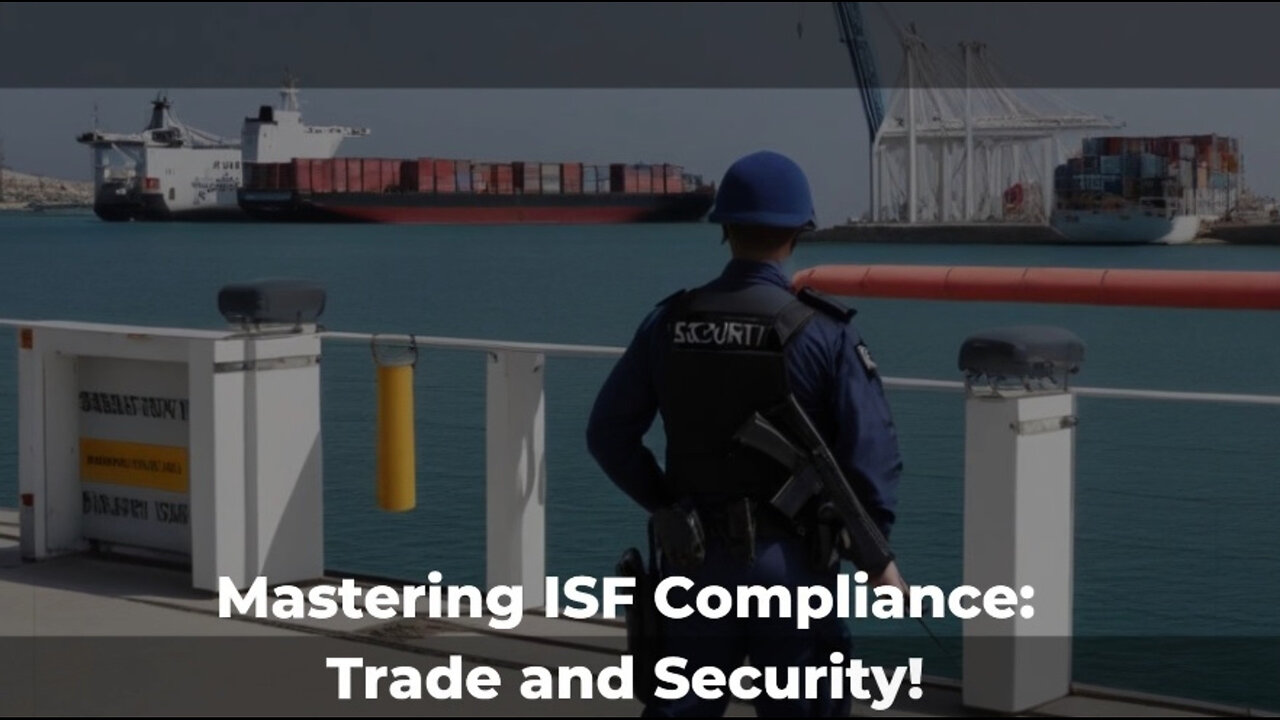Premium Only Content

Mastering ISF Compliance: The Key to Secure and Efficient Trade
License To Import // 323-578-6432 // file@licensetoimport.com // www.licensetoimport.com
In this video, we explore the topic of ISF compliance in customs brokerage, discussing how it balances trade facilitation and security measures. ISF, or Importer Security Filing, is a requirement by US Customs and Border Protection (CBP) that mandates importers or their customs brokers to provide cargo information before loading goods onto a vessel bound for the US. While enhancing security, ISF compliance also aims to facilitate trade by ensuring the smooth flow of goods, preventing delays, and promoting efficient customs clearance processes. Key information required for ISF filings includes details about the shipper, consignee, manufacturer/supplier, country of origin, and HS code. Timely submission of ISF filings is crucial, with a deadline of 24 hours before loading, and non-compliance can lead to penalties, shipment holds, or denial of entry. Understanding bond requirements and working with knowledgeable customs brokers is essential. Compliance with ISF contributes to the security and efficiency of international trade.
#CustomsCompliance #ISFRequirements #TradeFacilitation #SmoothSupplyChain #InternationalTrade #CustomsBond #PenaltiesForNonCompliance #TradeEfficiency #CargoMovements #StayInformed
Video Disclaimer Here: This video is solely for education and is not endorsed by any US government agency.
"00:51 - ISF Compliance Balances Trade and Security: ISF, or Importer Security Filing, is a requirement by US Customs and Border Protection (CBP) that enhances the security of the international supply chain while also facilitating trade.
1:12 - Information Required for ISF Filings: Importers or their customs brokers must provide key information such as shipper details, country of origin, and commodity codes to ensure accurate and timely submissions.
1:38 - Timely Submission is Crucial: ISF information must be submitted to CBP at least 24 hours before cargo is loaded onto a vessel, with penalties for late filings including shipment delays or holds.
2:03 - Bond Requirements and Penalties: Some importers need a customs bond to comply with ISF regulations, while non-compliance can result in fines and potential cargo holds or denial of future shipments.
"
-
 10:46
10:46
Degenerate Jay
13 hours ago $5.89 earnedThe Rejected Superman Ending Of Smallville Would Have Changed Everything
18.1K5 -
 19:01
19:01
Jamie Kennedy
12 hours agoWe're in a World of Dummies! | From Ep. 176 Hate to Break It To Ya w/ Jamie Kennedy
17.3K -
 3:54
3:54
BIG NEM
19 hours agoWelcome to #NEMSWORLD UNCUT. The World's First Uncensored Sketch Comedy Podcast.
8.51K2 -
 3:09:28
3:09:28
Price of Reason
14 hours agoElon Musk TARGETED By Hollywood & MSM! Yellowstone DISAPPOINTS! Dragon Age Veilgard DISASTER!
71.3K16 -
 5:03:12
5:03:12
Akademiks
9 hours agoLil Durk Pleads NOT GUILTY and Hires NBA Youngboy Lawyer To Represent him! Lil Baby tryna comeback?
119K14 -
 3:27:19
3:27:19
SNEAKO
11 hours agoSNEAKO X JACE!
90.2K12 -
 57:42
57:42
The Charlie Kirk Show
10 hours agoTHOUGHTCRIME: Clash of the Cabinet Edition
153K44 -
 1:04:59
1:04:59
Man in America
14 hours agoThe Dark Truth Behind Sunscreen, Cancer, Pharmakeia & Doctor Worship w/ Jonathan Otto
55.9K13 -
 49:35
49:35
PMG
1 day ago $15.13 earned'Ukraine and the Giant Distraction!"
54.4K10 -
 1:32:50
1:32:50
Kim Iversen
12 hours agoSHOCKING: New Evidence That Fauci Lied, People Died | Thank You, Dr. Fauci
136K113